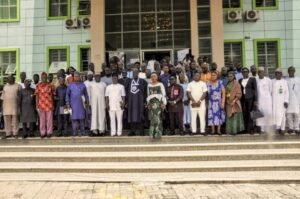The Federal Government is moving to integrate Agricultural Insurance into the National Agricultural Growth Scheme and Agro-Pocket Program (NAGS-AP) to bolster sustainability and food security.
This initiative was announced by the Minister of State for Agriculture and Food Security, Sen. Abdullahi Sabi Aliyu, during the Agricultural Insurance Train-the-Trainer Workshop held recently in Abuja.
Aliyu highlighted the need for the integration to safeguard the government’s investments and address risks from climate change that threaten agricultural output.
He noted that the Agricultural Insurance Scheme aims to protect against harvest losses due to factors such as floods, droughts, pests, and diseases.
Aliyu recalled that the program started with wheat cultivation in the 2023 dry season, yielding favorable results due to good weather.
However, he emphasized the necessity of a climate risk mitigation solution to address the gaps exposed by climate change.
He cited the 2023 ginger blight in Kaduna, which led to significant losses for farmers, illustrating the need for effective insurance coverage.
“The estimated losses of N12 billion for Nigerian ginger farmers due to the blight epidemic underline the urgent need for comprehensive insurance solutions,” Aliyu said.
He also referenced the 2024 Annual Flood Outlook report, which identifies over half of Nigeria’s local government areas as at risk of flooding.
To address these challenges, the Ministry has formed a joint working committee with representatives from the NAGS secretariat, the Nigerian Agricultural Insurance Corporation (NAIC), and PULA Advisors.
This committee is tasked with developing a practical framework for a national Agricultural Insurance scheme and organizing training to inform stakeholders about its benefits.
The National Project Coordinator for NAGS-AP, Mr. Isiaku Buba, and the Managing Director of NAIC, Mrs. Folashade Joseph, also supported the initiative, emphasizing their commitment to improving agricultural output and food security.

The workshop was attended by various stakeholders, including representatives from the All Farmers Association, USAID, REX Insurance, and NAIDA.


